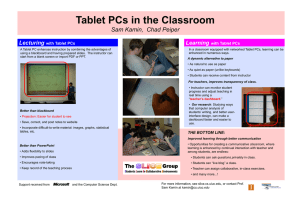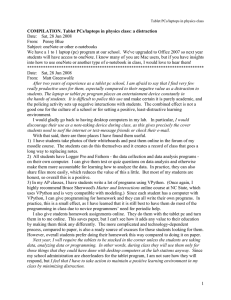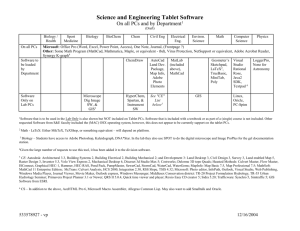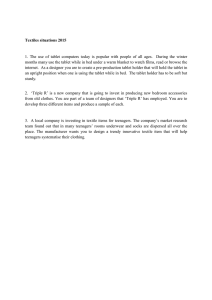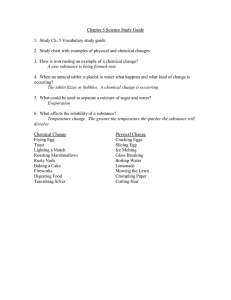Active Learning with Tablet PCs
advertisement
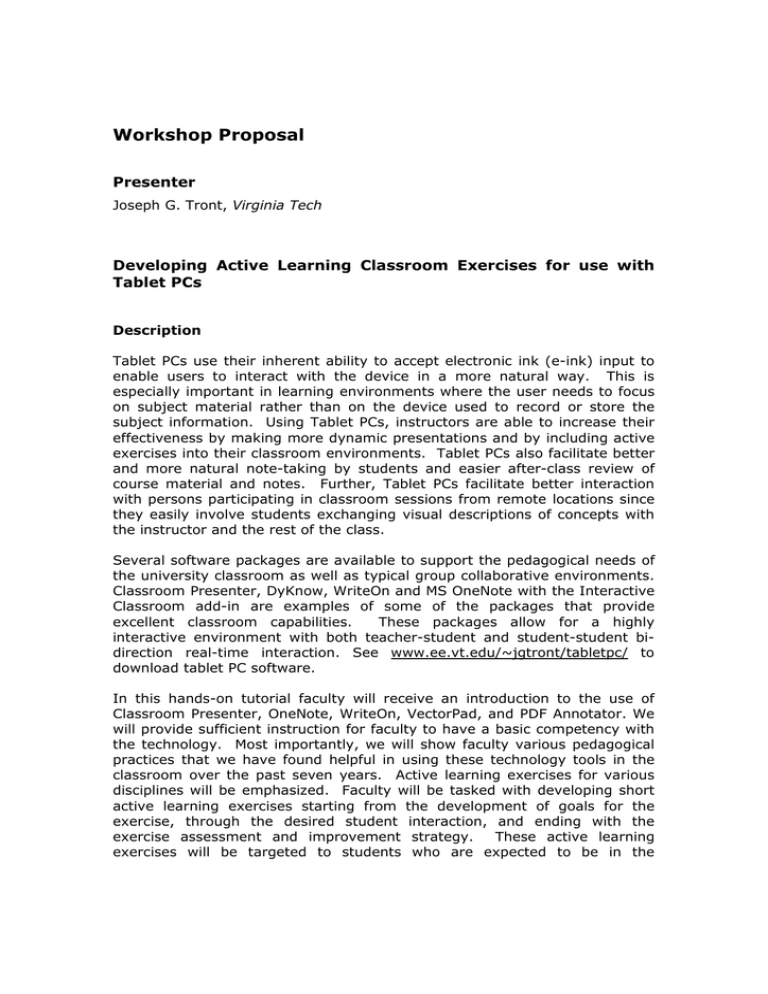
Workshop Proposal Presenter Joseph G. Tront, Virginia Tech Developing Active Learning Classroom Exercises for use with Tablet PCs Description Tablet PCs use their inherent ability to accept electronic ink (e-ink) input to enable users to interact with the device in a more natural way. This is especially important in learning environments where the user needs to focus on subject material rather than on the device used to record or store the subject information. Using Tablet PCs, instructors are able to increase their effectiveness by making more dynamic presentations and by including active exercises into their classroom environments. Tablet PCs also facilitate better and more natural note-taking by students and easier after-class review of course material and notes. Further, Tablet PCs facilitate better interaction with persons participating in classroom sessions from remote locations since they easily involve students exchanging visual descriptions of concepts with the instructor and the rest of the class. Several software packages are available to support the pedagogical needs of the university classroom as well as typical group collaborative environments. Classroom Presenter, DyKnow, WriteOn and MS OneNote with the Interactive Classroom add-in are examples of some of the packages that provide excellent classroom capabilities. These packages allow for a highly interactive environment with both teacher-student and student-student bidirection real-time interaction. See www.ee.vt.edu/~jgtront/tabletpc/ to download tablet PC software. In this hands-on tutorial faculty will receive an introduction to the use of Classroom Presenter, OneNote, WriteOn, VectorPad, and PDF Annotator. We will provide sufficient instruction for faculty to have a basic competency with the technology. Most importantly, we will show faculty various pedagogical practices that we have found helpful in using these technology tools in the classroom over the past seven years. Active learning exercises for various disciplines will be emphasized. Faculty will be tasked with developing short active learning exercises starting from the development of goals for the exercise, through the desired student interaction, and ending with the exercise assessment and improvement strategy. These active learning exercises will be targeted to students who are expected to be in the classroom as well as those who may be taking the course at extended campus locations. Exercises will be determined by the individual faculty member’s disciplinary interests. Learning Objectives Tutorial participants: Will be able to use Tablet PCs to significantly enhance the teacherstudent and student-student interaction in the engineering learning environment. Will have the understanding of how to transform their classrooms into a much more active learning environment. Will understand Tablet PC technology well enough so that they can begin to convert their PowerPoint presentations into notes capable of being used in a real-time electronic ink environment and make more engaging presentations. Will be able to evaluate the effectiveness of the course transformations produced by the introduction of the Tablet PC and new pedagogical techniques as related to the overall course learning objectives. Intended Audience Faculty members from a broad spectrum of disciplines can benefit from attending this tutorial. The desire to improve teaching and learning through the appropriate use technology is the only prerequisite. Participants should also be willing to partake in the lively discussions that this tutorial generally invokes. The tutorial will be at a level that will allow faculty members who have a minimum of technology training to participate. Faculty should know how to develop PowerPoint presentations. Contact Information Presenters: Joseph G. Tront, Virginia Tech, jgtront@vt.edu, 540-231-5067 Dr. Joseph G G. Tront is a profes ssor in the e Bradley Departme ent of Elec ctrical and d Compute er Engineering at Virrginia Tech. He has had a lea adership ro ole in the NSF sponsored eng gineering e education coalition c c called SUCC CEED whe ere he was s the director of the center forr computin ng and com mmunicatio ons for the e nine univ versity coa alition. In his work in educatiion digital libraries, he is the e editor for NEEDS an nd is co-e editor for the engineering collection off MERLOT. Dr. nt also s serves as editor ffor the P Premier Award for Excellenc ce in Tron Eng gineering Education n – an internation nal award competition aime ed at reco ognizing o outstanding g non-com mmercial c courseware for use in engine eering edu ucation. He has published p articles in various s venues describing g the app propriate u use of technology in n higher education. e He is developing tools and d techniqu ues for us sing Tablet PCs in the classrroom whe ere his wo ork is sponsored by y Microsoft and HP. He is currrently playing a lead role in Virginia uirement initiative in which all entering engine eering Tech’s Tablett PC Requ dents are required to own a Tablet PC C. In 2 2005, Dr. Tront won the stud Excalibur Award for Ex xcellence in Teaching with Technology T y, in 2007 7 the Laureate Awa ard from T The Comp puterworld Honors Program, P a and in 200 08 he the W.S.”Pete ented e” White A Award for Innovatio on in Teac ching. He has prese this s workshop at overr 35 venu ues for audiences comprised d of university edu ucators.
